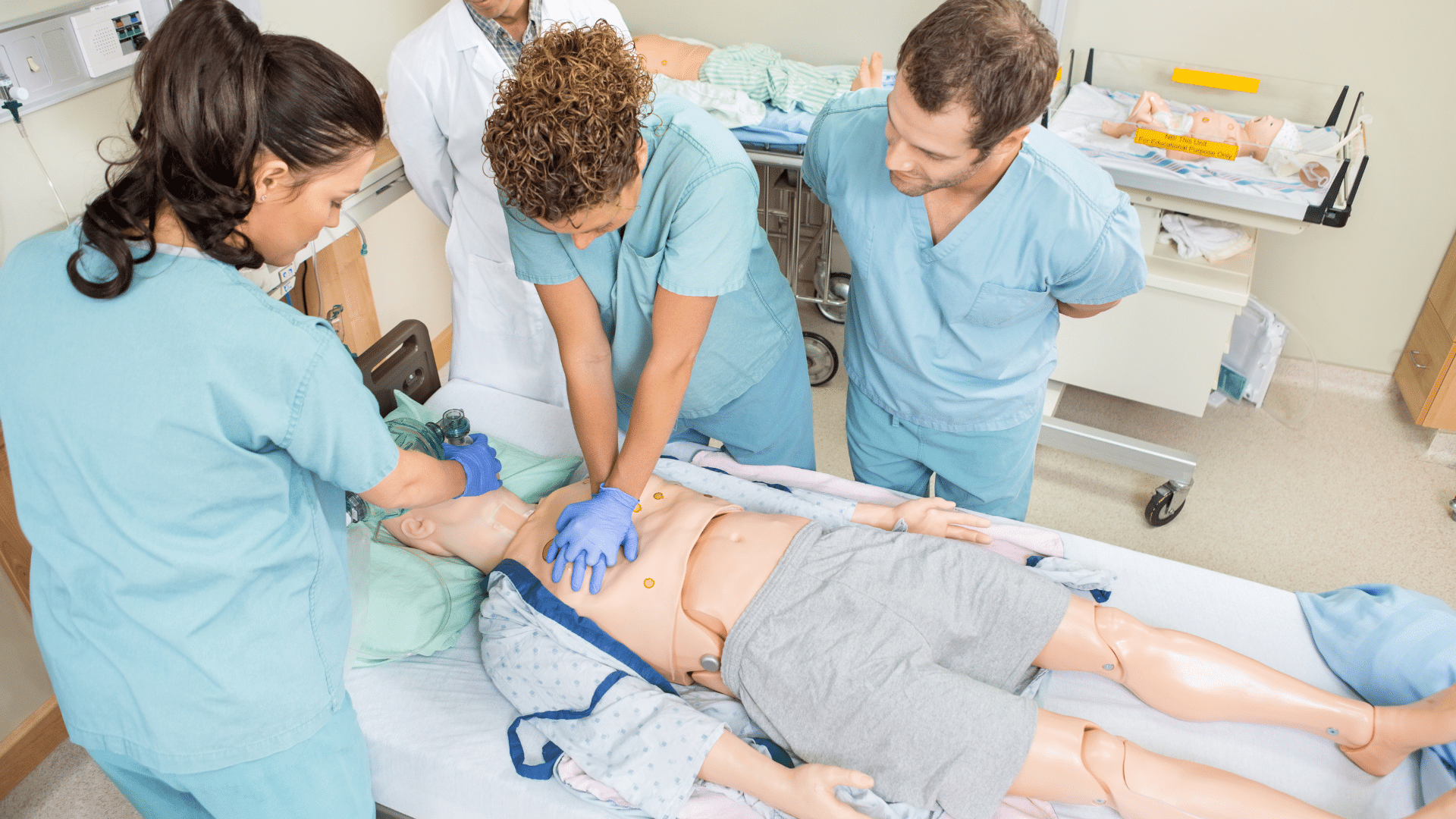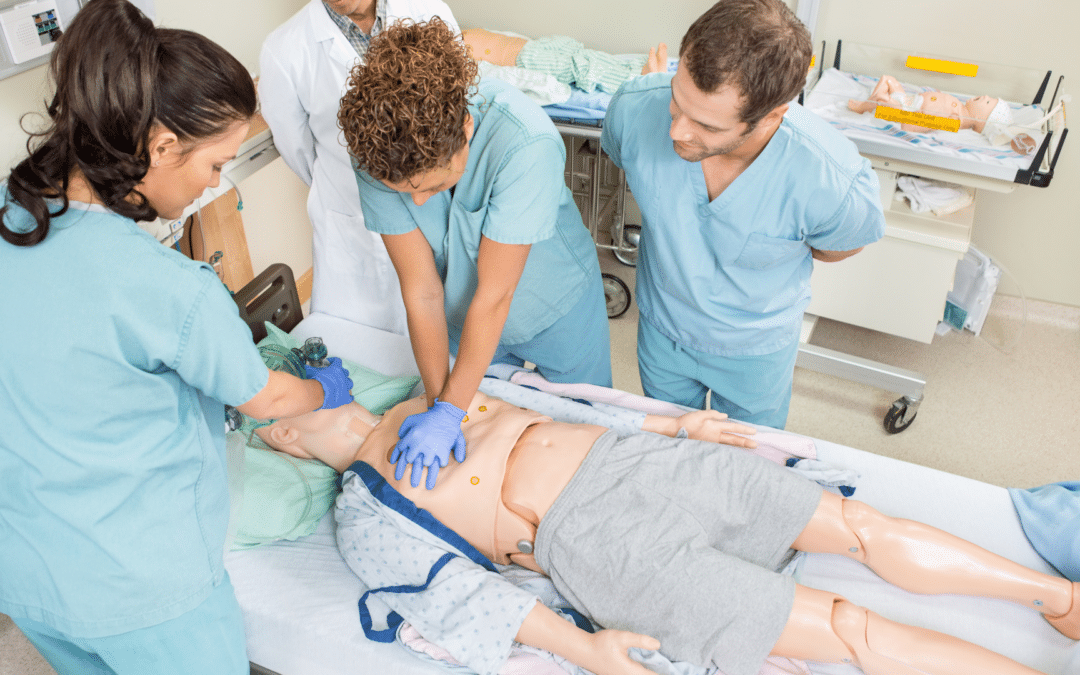
As a nursing student, you can expect to take a standard core of nursing degree courses while pursuing your dream of joining this respected medical profession.
These courses will help you master your medical skill set so you can hit the ground running in your exciting new career! So where do you start?
Anyone wishing to level up their nursing career and become a registered nurse (RN) must first complete their Bachelor of Science in Nursing (BSN) degree.
A BSN program encompasses a broader scope of nursing responsibilities than entry-level nurses have, including administering advanced procedures, physical assessments, and long-term care.
While taking some introductory nursing degree courses early in their college career, nursing students must also take communication, math, and psychosocial courses to ensure they receive a well-rounded education.
Since every student must take the NCLEX after graduation to become a fully licensed nurse, most schools offer similar nursing degree courses covering the exam’s general topics. For this list, though, we’ll pull 12 nursing degree courses out of Davis & Elkins’ very own 4-Year BSN degree program. We’ll plug the course abbreviations in the headings if you’d like to follow along!
Why a Well-Rounded Education is Important
The nursing profession is incredibly diverse.
Our healthcare system is a fast-moving field constantly evolving as it adopts innovative technology and new ways of thinking. That’s why medical professionals must equip themselves with a toolkit of critical thinking and communication skills.
You can expect to take the following general education courses early in your nursing education.
1. Communications (COMM 100 level or 221)
Good interpersonal communication is one of the most sought-after proficiencies in most skilled professions, not the least of which is nursing.
For instance, as a nurse, you’ll likely have difficult conversations with some of your patients about their medical prognosis. Therefore, it’s important that you know how to approach the discussion confidently and with empathy.
Also, ethical and legal issues can often pop up between patients and healthcare providers. So nursing students must know how to communicate those situations effectively to relevant parties.
2. Psychology (PSYC 200 – Life Span Development)
Nurses must have a fundamental understanding of mental health and the brain’s influence on physical well-being over a person’s entire life span.
Psychology education will give you better insight into personality patterns, which will assist you in communicating with patients and colleagues.
3. Math (MATH 101 or higher)
As a nurse, you’ll be responsible for calculating and administering the proper medications to numerous patients.
A miscalculated treatment could have serious consequences. Therefore, it’s imperative that you understand how to interpret different medical procedures and measure proper dosages.
You will also need to process a consistent amount of patient data, so a statistics course and some form of college algebra are commonly required.
Core Nursing Degree Courses
While bolstering your comprehensive skills through general prerequisites, you’ll get your first taste of fundamental nursing concepts in the following nursing degree courses.
These courses will be the foundation on which you will build your nursing expertise and will prepare you to take the NCLEX so you can earn your RN license.
4. Introduction to Nursing (NURS 100B)
Every learning journey begins somewhere. This course is critical to helping students understand fundamental nursing concepts.
In this course, students learn how to evaluate the nursing process and learn the basic skills to help them safely and effectively care for their patients.
You’ll also have opportunities to demonstrate your aptitude for assessing your patients’ physical and psychosocial needs in structured lab and clinical settings.
5. Nutrition (NURS 107)
It’s no secret that good nutritional habits are vital to our bodies’ proper development and care.
As a nurse, you’ll often need to address nutrition concerns with your patients regarding their general health and specific medical conditions.
Subjects may often include dietary habits, maternal considerations, and cultural patterns.
6. Introduction to Pharmacology (NURS 108B)
In pharmacology, you’ll learn about different medications and how to administer them safely. You will also study how to educate your patients on potential drug interactions and side effects.
Some of the introductory discourse in pharmacology includes:
- Pharmacokinetics — Drug absorption, distribution, metabolism, and excretion
- Pharmacodynamics — Drug concentration and how it relates to its effect
- Quality and Safety Education for Nurses (QSEN) competencies
- Contemporary issues around the pharmaceutical industry
A pharmacological background is critical to identifying a drug’s effectiveness and any adverse side effects your patients may experience.
7. Anatomy (BIOL 107)
The human body is a complicated assortment of biological parts. As such, nurses need to be able to comprehend its structure.
In anatomy, you’ll analyze and learn the terminology of the body’s primary systems, including the skeletal, muscular, cardiovascular, and nervous systems. You’ll spend most of this course doing lab exercises, so you’ll get plenty of hands-on learning about how the body is put together!
This information will help you better understand the relationships between these systems and how they apply to certain conditions and procedures.
8. Physiology (BIOL 108)
If anatomy class is the study of the human body’s blueprint, then physiology studies how all the parts run and function together.
Our bodies maintain themselves through intricate functions that are interdependent on multiple systems. Those mechanisms include circulation, respiration, digestion, and reproduction, to name a few.
By understanding how these processes affect a patient’s physiological status, you can respond to complications accordingly. For example, extensive knowledge of the respiratory system is vital in treating a patient suffering from Covid-19 or another serious respiratory illness.
9. Community Nursing (NURS 303B)
Community nursing expands on individual healthcare by examining socioeconomic and environmental factors affecting patients and their families.
In this public health discourse, you’ll learn how public safety, local culture, homelessness, pollution, city planning, and other social issues contribute to your community’s overall physical and mental health.
By studying these tertiary elements, you can better identify and treat marginalized patients in your sphere of influence.
10. Ethics (PHL 203)
Unfortunately, ethical dilemmas can rear their head when you provide patient care as a nurse. If that happens, you’ll need a framework on how to proceed.
Ethics in nursing focuses on addressing various problems of social and personal behavior for patients and medical professionals alike.
Your patients and colleagues will expect you to make decisions that reflect specific professional standards. This course will teach you how to navigate complex issues in a manner that respects your patients’ autonomy and avoids unwarranted harm.
11. Nursing Leadership (NURS 306B)
As a registered nurse, other licensed practical nurses (LPN) and aides will look to you for direction. Collaboration is essential for a well-managed healthcare environment, so good leadership and management skills are necessary.
This course will help you develop your resource management, patient advocacy, and coaching proficiencies.
It can also lead you to career advancement in other leadership positions, such as a nurse educator or clinical nurse specialist.
12. Evidence-Based Practice (NURS 304B)
As mentioned earlier, modern healthcare is a fluid field. Scientists are constantly making revolutionary breakthroughs, and the industry’s technology is advancing exponentially.
Nurses have to be able to make critical decisions based on current and reliable research presented to them.
That’s why Evidence-based Practice is critical to teaching future nurses how to make important decisions that will give their patients the best possible outcomes.
How Can I Get Started On My Nursing Degree?
All accredited BSN programs are required to teach material included in the NCLEX exam.
But at Davis & Elkins, we believe you deserve much more than the bare minimum. As a nursing student, you’re a future leader in one of the most honorable professions in the world — and we want to invest in you.
Our nursing programs offer dynamic hands-on learning in our state-of-the-art medical facilities.
We also work around your busy schedule to help you build strong relationships with our respected medical community.
We’d love it if you became part of our Davis & Elkins family! If you’d like more info, give us a shout-out!

